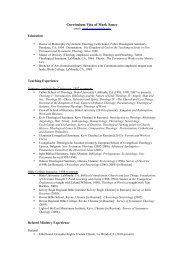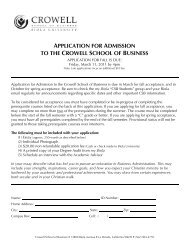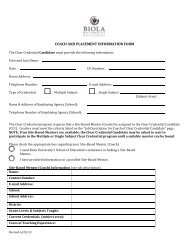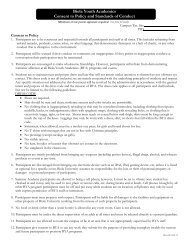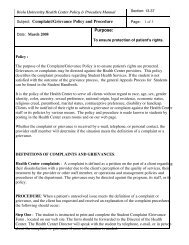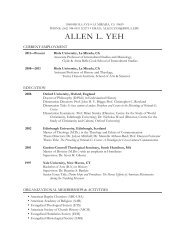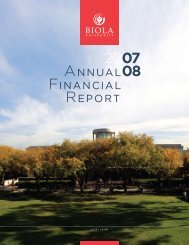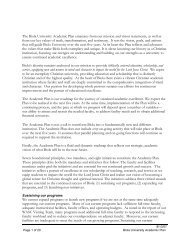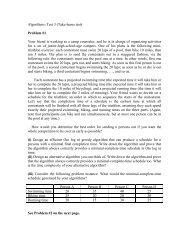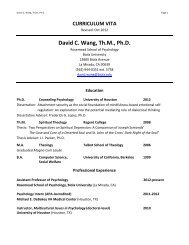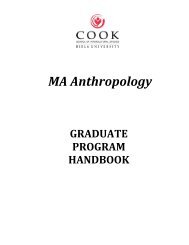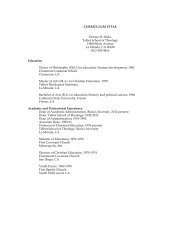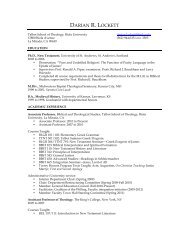You also want an ePaper? Increase the reach of your titles
YUMPU automatically turns print PDFs into web optimized ePapers that Google loves.
Mathematics<br />
Faculty<br />
Chair: .............................................................................Edward Thurber, Ph.D.<br />
Professor: .................................................................................................. Thurber<br />
Associate Professors: ...........................................................................Stangl<br />
Objectives<br />
The Department of Mathematics at <strong>Biola</strong> <strong>University</strong> provides several<br />
areas of concentration in addition to a basic core curriculum. The<br />
student is allowed considerable flexibility in the major, depending<br />
upon vocational or professional goals. Our student labs are equipped<br />
with numerous Pentium and Macintosh workstations. We also have<br />
a Computer Science Alcove equipped with the latest Pentium IV<br />
platforms running either Windows or Linux.<br />
The department endeavors to provide (1) a strong foundational<br />
core curriculum for the student desiring to pursue graduate study<br />
in both the pure and applied fields of mathematical science, (2)<br />
course work and training to prepare students for applied mathematical<br />
sciences (statistics, computer science, operations research and<br />
actuarial science) and the field of teaching, (3) support courses for<br />
the curriculum of other majors (biological science, physical science,<br />
engineering, business and nursing) and (4) courses basic to gaining<br />
some knowledge of mathematics as part of a liberal arts education.<br />
The department provides an attractive and thorough offering in<br />
mathematics as part of God’s creation and there is a concerted effort<br />
to integrate faith and learning.<br />
Degree Program<br />
A Bachelor of Science degree in Mathematical Sciences is offered<br />
upon completion of the university baccalaureate and the math<br />
major in one of the emphases. Those who plan to pursue graduate<br />
studies should take at least two of 410, 450 or 480 regardless of the<br />
area of concentration.<br />
Majors<br />
a P P l I e d m at h (47 U n I t s)<br />
Students who are interested in preparing for careers in business or<br />
industry should choose this emphasis. Courses introduce a variety of<br />
areas of applied mathematics. This emphasis must complete: Math<br />
1<strong>05</strong>, 106, 112, 2<strong>05</strong>, 291, 3<strong>05</strong>, 315, 321, 331, 332, 333, two units of 370,<br />
435 or 440, one course (3 units) at the 300 or 400 level in Math, and<br />
Computer Science 1<strong>05</strong>.<br />
Co m P U t e r s C I e n C e (53 U n I t s)<br />
This emphasis allows a mathematics major the opportunity to<br />
focus on the more mathematical aspects of computer science. This<br />
emphasis must complete: Math 1<strong>05</strong>, 106, 112, 2<strong>05</strong>, 291, 3<strong>05</strong>, 315, at<br />
least two of 321, 331, 332, 333, two units of 370; Computer Science<br />
1<strong>05</strong>, 106, 202, 400; and three courses (9 units) at the 300 or 400 level<br />
in math or computer science.<br />
m at h e m at I C s (47 U n I t s)<br />
This emphasis allows the student flexibility in the selection of upper-division<br />
courses. A faculty advisor will aid the student in making<br />
these choices. The student planning to pursue mathematics in<br />
graduate school would find this particularly appropriate. This emphasis<br />
must complete: Math 1<strong>05</strong>, 106, 112, 2<strong>05</strong>, 291, 3<strong>05</strong>, 315, two units<br />
of 370; Computer Science 1<strong>05</strong>; and six courses (18 units) in math at<br />
the 300 or 400 level.<br />
m at h e m at I C s s e Co n da ry te aC h I n G (6 3 U n I t s)<br />
Students who wish to prepare to teach mathematics at the highschool<br />
level should select this emphasis. These students work toward<br />
a preliminary single-subject credential and should consult the<br />
Education Department. This emphasis must complete: Math 1<strong>05</strong>,<br />
106, 112, 2<strong>05</strong>, 291, 3<strong>05</strong>, 315, 331, 332, 341, two units of 370, 415, two<br />
courses (6 units) at the 300 or 400 level; Computer Science 1<strong>05</strong>, and<br />
Education 301, 330, 341, 425, and 435.<br />
All concentrations must include 24 upper division units.<br />
note: The general education requirement for a foreign language<br />
for those following a mathematical sciences major may be<br />
met by two years of high school language or the first four<br />
units of a college language. The science / mathematics<br />
requirement may be met by three units of science.<br />
Minor<br />
A Mathematical Sciences Minor is offered with the completion of 23<br />
units, six of which must be upper division. Students must consult<br />
with a department adviser. The basic curriculum for a minor is 106,<br />
112, 2<strong>05</strong>, 291, two courses (6 units) at the 300 or 400 level and Computer<br />
Science 1<strong>05</strong>.<br />
Courses (MATH)<br />
math 101 Precalculus mathematics ......................................................3<br />
Sets, the real number system, relations, functions, graphs,<br />
algebraic processes, inequalities, trigonometric functions,<br />
exponential and logarithmic functions, introduction to se-<br />
quences. Prerequisite: three years of high school mathematics<br />
or consent. Cannot be counted toward the major. Spring.<br />
math 102 Topics in mathematics ........................................................1-2<br />
Topics in mathematics selected from general education math-<br />
ematics classes. Arranged in conjunction with the individual<br />
needs of the student. Prerequisite: consent.<br />
math 103 Calculus for management sciences .................................3<br />
Fundamental principles of differential and integral calculus.<br />
Applications chosen mainly from the management sciences.<br />
Prerequisite: passing proficiency exam administered by<br />
Mathematics Department or receiving a “C” or better grade in<br />
Intermediate Algebra the prior year. Fall, spring.<br />
20<strong>05</strong> – 20<strong>07</strong> C ATA LO G Undergraduate Programs 119



